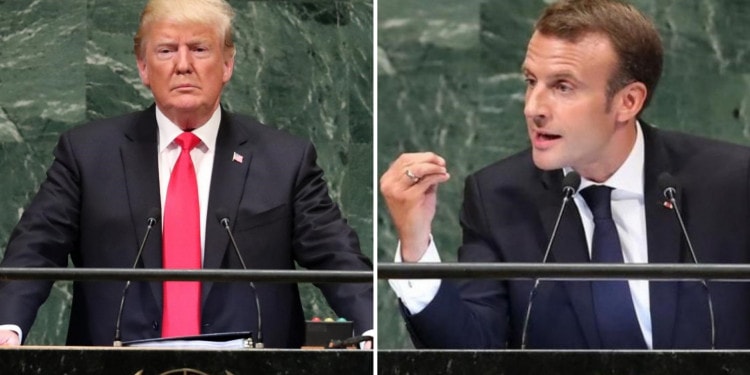The fight between US President Trump and French President Macron at the United Nations General Assembly hit headlines around the world. It was a classic clash of values, openness and multilateralism promoted by Macron vs. unilateral nationalism, the “doctrine of patriotism” touted by Trump. Here are the highlights:
But the real differences in the style of the two leaders exploded at the UN Security Council on 26 September, this year exceptionally chaired by Trump.
He started with a long speech that was singularly devoid of specifics but included an unexpected attack on China, accusing the Chinese to interfere in the upcoming midterm elections – unexpected because it was totally off-topic, the agenda of that particular UN Security Council being the question of nuclear proliferation and how to address it (including the question of Iran and the sanctions the US are placing on anyone trading or investing in Iran). Here is Trump’s long-winded, meandering opening of the Security Council session:
Remarkably, Trump accused the Chinese of interfering in the midterm elections (watch the Chinese Ambassador give an ever so discreet shrug off ) but he made no reference to Russian meddling in the 2016 elections. This is a rookie mistake: A good chairman stays on topic, his task is to keep the meeting focused and he is supposed to set the example in his own intervention. On this score, Trump failed.
Macron’s answer, coming on the heels of Trump’s meandering speech, is the exact contrary, totally focused on the topic at hand. And it is remarkable for its concision and the relevant points he makes:
He is gently reminding Trump that without cooperation between allies, the threat of nuclear, chemical, biological and ballistic weapons proliferation will never be contained. He informs that the next G7 meeting in 2019 (to be hosted by France) will discuss these issues and concludes: “Our nonproliferation regime is the backbone to our collective security system that we built decade after decade and it is still in its young days and it requires our sense of responsibility and unity.”
Verification systems urgently need to be strengthened, particularly as terrorist groups are interested in weapons of mass destruction and eager to use them. And he reminds the Security Council that the use of chemical weapons, particularly by Russia, needs to stop. He adroitly drops soothing compliments on Trump, noting that opening talks with North Korea was a smart move. He also agrees with Trump that renegotiating the deal with Iran is necessary, but a solution must be found.
Iran is in fact a bone of contention between the U.S. and its European allies. Britain, France and Germany — along with Russia and China — had all pleaded with President Trump to remain in the six countries’ 2015 accord with Iran on ending its nuclear program. To no avail.Full US sanctions are set to hit Iran in November and the country’s economy is already slowing down.
On Monday 24 September, after talking with Iranian Foreign Minister Mohammad Javad Zarif, Federica Mogherini, the EU foreign policy chief announced the Europeans would establish a “legal entity” for businesses to transfer money, thus escaping Washington’s supervision.
There was an explosion of anger on the American side, bringing back memories of the feud over the 2003 Iraq invasion. The United States denounced the Europeans who in turn made clear they would not back down. US Secretary of State Mike Pompeo said he was “disturbed and indeed deeply disappointed”, that this was “one of the of the most counterproductive measures imaginable for regional and global peace and security.”









